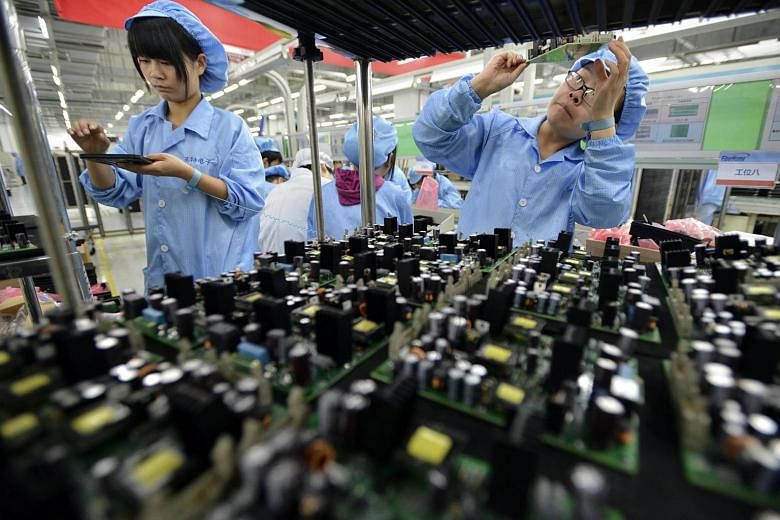Asian shares fell yesterday on news that manufacturing in China plunged last month, confirming fears that the stock market rout has spilled into the wider economy.
Singapore added to the gloom with data showing that local manufacturers returned to the red in July after two months of growth.
The China purchasing managers' index (PMI) reading caused the biggest tremor. Declines in new work and export orders led factory bosses to cut production at the fastest rate since November 2011, according to the Caixin PMI - previously known as the HSBC PMI - out yesterday. The headline number fell to 47.8 in July from 49.4 in June. A reading above 50 indicates expansion; one below points to a contraction.
Last Saturday, a separate index targeting bigger industrial firms showed a July reading of 50, down from 50.2 in June.
It was a similar story here. Singapore's PMI fell to 49.7 last month from 50.4 in June. Manufacturers turned cautious as new orders, output and hiring fell, while inventory and stocks of finished goods rose, said the Singapore Institute of Purchasing & Materials Management, which compiles the PMI.
"This is a typical case of earlier optimism by manufacturers now being weighed down by the hard truth of weak demand," said DBS economist Irvin Seah.
Besides, the earlier expansion was "questionable", given the poor performance in regional PMIs and the slowdown in China, he said.
Malaysia posted a July PMI of 47.7 yesterday, little changed from the 47.6 in June, which was the worst reading in over 2-1/2 years. This and the weak Chinese PMI data sent the ringgit tumbling against the greenback. At its intra-day low around 8pm last night, one US dollar was worth as much as RM3.8610, from a close of RM3.8190 last Friday.
Regional share markets were also shaky. The benchmark Straits Times Index closed 9.71 points lower at 3,192.79, Shanghai shares were down 1.11 per cent and Shenzhen shares fell 2.72 per cent, while Hong Kong's Hang Seng Index fell 0.9 per cent and South Korea closed down 1.07 per cent. The poor factory data all round was not unexpected, but is "distressing" nonetheless, said Bank of America Merrill Lynch economist Chua Hak Bin.
"China's slowdown is more than offsetting the positive data from the United States. We are already in a manufacturing recession and I don't think we can dismiss the risk of entering a technical recession next quarter," added Dr Chua.
With China fumbling in its roles as a giant consumer and falling global growth hurting its production chain, the outlook for Singapore looks bleak, said OCBC economist Selena Ling. "If you look at non-oil domestic exports, China is now our biggest trading partner, overtaking the US and EU," she said. "There is no real growth catalyst for the Singapore economy at this juncture."
To be sure, some of Singapore's slowdown stems from restructuring woes. "It's clear that the costs are high here and that access to workers is stricter. Eight years ago, manufacturing used to be 25 per cent of gross domestic product (national output), now it's 17 per cent. Soon, we will go the way of Hong Kong, where it's less than 5 per cent of GDP," said Dr Chua.


